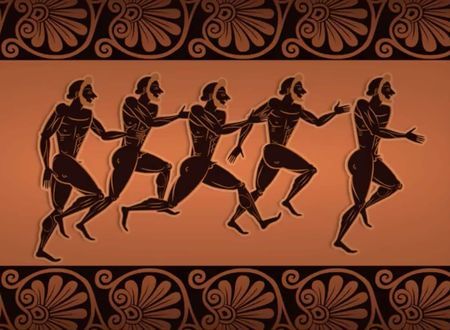Can meditation change the very building blocks of human growth? Now, I’m not asking whether meditation can make us taller and slimmer, but how many more people would meditate if that were possible? Though then, like an overstuffed teddy bear, Swamiji’s workload would have him busting at the seams!
Although, in the Black Lotus app, there is an inspirational tidbit that states that we can begin to look 5 to 10 years younger than our biological age with prolonged meditation. So, please look in a mirror now and think to yourself: “I can still look like this in 10 years!” Of course, half of you may smile at this, though the other half might be in tears depending on how kind time has been to you so far! But to be able to freeze time and slow the ageing process, who wouldn’t want to do that!
I think we can also radically transform ourselves through meditation to fundamentally feel like a person made from a different genetic recipe. In molecular science, DNA is studied through three-letter combinations of nucleotides (A, C, T, or G) which are read like instructions and used to create proteins that shape us both figuratively and literally as humans. These chemical units make up three-letter words, which generate instructions that dictate our traits.
Every normal human cell contains 23 pairs of chromosomes, which store these instructions as genes in the cell’s nucleus. A telomere is a cap that appears at the end of each chromosome and protects it from becoming frayed or tangled. Short telomeres are generally considered signs of ageing, worsening health, and potentially an early death.
Our DNA may be determined when the sperm meets the egg, but we can impact which genes are the most expressed in our lives. For instance, the environment you grow up in can impact the telomerase activity of different genes making some more active and thus more expressive than others. Our inner world of hormones and metabolism also affects our genetic expressions. Samskaras, or latent impressions from previous lives, also work similarly.
For example, someone who has never gambled before becomes addicted to gambling after their first bet. They probably had a samskara of gambling from a previous life and thus should avoid it in this life at all costs. If we can affect which genes are expressed, shouldn’t we try to make the positive ones the most active? Meditation may be one way to encourage this.
This excellent article from Mindbodygreen.com summarizes some of the incredible benefits of mediation.
1. Meditation keeps your hippocampus healthy to enhance learning and memory, according to these researchers at Harvard
2. Meditation tells your amygdala to chill out and helps to lower stress levels. The same team of Harvard researchers also found that mindfulness meditation decreases brain cell volume in the amygdala, the part of our brain responsible for fear, anxiety, and stress.
3. Meditation builds a faster, fatter, and fitter frontal cortex, helping to improve focus, concentration, and attention.
4. Meditation increases gray matter and lengthens telomeres helping to slow the effect of ageing in the brain
5. Meditation activates the insula, enhancing empathy and compassion.
Much like our DNA, our consciousness is also affected by forces that seem beyond our control. Our conditioning, habits, and biases drive our thoughts and behaviours from birth and even prior. These instructions are often read and interpreted by our subconscious and tell us how to react in many situations, so we don’t have to think consciously about what we are doing. Unfortunately, while having a predetermined set of reflexive reactions to many scenarios that life may throw at us might save a little time, they can be very costly in other ways.
For instance, a quick outburst of anger or feeling sad or jealous may drive our behaviour, and we find that we act out in a way that hurts those around us and creates the same negativity in the ones close to us. Instead of acting reflexively, if we are able, at the moment, to slow down and choose our response consciously, we’d be much better off. Because, as Om Swami has taught us, whatever you share grows. Share anger with someone, and the bitterness rises in them and sets off a cascade of events. The same goes for sharing truth and love. Meditation gives us a choice.
Much of this conditioning comes from our parents and society at large. As a result, ideas about masculinity and femininity, notions of right versus wrong, acceptable and unacceptable, etc., are constantly reinforced when we go out into the world. I’m not saying any of that is terrible, but it’s the reflex action we must acknowledge and put under a microscope.
Imagine you are looking at a samurai sword, and you are amazed at the sharpness of the blade. Anyone who looks at it would agree; that it is perfect. But, look at the same edge under a microscope, and it will look like a mountain chain. In other words, there are levels of perfection, and the game gets subtler as we progress on the path.
What once seemed like “normal” behaviour appears differently as we move about the world with mindfulness and alertness. Put that behaviour under the microscope of mindfulness, and much like a codon is made of smaller nucleotides, we become aware that this behaviour came about through a series of near-instantaneous thoughts and judgments which happen so fast that it occurs outside of our conscious awareness.
Mindfulness thus acts as a short circuit to prevent the execution of these automatic actions learned over the years (lifetimes); this DO NOT EXECUTE line of code allows us time to gather ourselves and act mindfully. In this way, new neural pathways are formed.
As we untangle those behaviours and bring them into our conscious lives, we can choose if this type of action fits our principles or if we need to make a change. Thankfully, this process happens gradually because otherwise, it might feel overwhelming as this churning unearths our latent tendencies and samskaras.
It’s one of the scariest and most difficult lessons I have learned; we are responsible for all the knots in our consciousness and have to walk the spiritual path by ourselves. A guru or someone you trust can point the way and assist, but we alone have to do the walking. If you haven’t taken the first step, there’s no time like the present!
If we can do a little meditation or prayer every day, we can create a chain of sadhana and use it to pull ourselves out of the illusion. Baba Hari Dass once said:
“If the aim is perfect, the chain of sadhana never breaks. Travelling, working, eating, talking — everything becomes sadhana.”
Swamiji has said something similar regarding Sankalpa or vows. He has encouraged us to take small Sankalpas, which, when completed successfully, boosts our confidence and willpower. Once we master minor vows, we move our way up to the bigger ones. Before you know it, you find yourself bound in a Sankalpa at all times; then, it dawns on you that your whole life may be one large Sankalpa. So you choose how you will live your life, vow to do it, and make a little progress every day.
Mediation is training our minds, and just like you work hard in the gym (and kitchen) to build muscle, turning inward is also hard work. If you find your mind revolting, the following quote may help you.
Baba Hari Dass said:
“You should not be afraid of your mind. It revolts in every person at the beginning of yoga practice. The mind is like a wild horse that doesn’t want anyone to sit on its back. When one tries to tame it, it jumps more. If you don’t tame it, it will not jump; but it cannot be used for uplifting the consciousness. So taming is very important. One should not put too much pressure on the mind in taming it.
Try to understand the mind peacefully. Just as a horse trainer feeds and pats the horse – slowly, carefully, and peacefully – so you can tame the mind. Living in jungles, fasting, and doing hard austerities is also a way, but it is dangerous and creates much pain. You should choose a middle path. Don’t let the mind be scattered, and don’t put too much pressure on it. You will see that slowly it will change.”
Sometimes life will throw things at you that counteract the benefits of mediation, making it even more important to stick to your practice. For instance, I have three little kids (age 4, 7, and 9), and anyone with kids would know they are designed and optimized to make parents age faster!









Comments & Discussion
45 COMMENTS
Please login to read members' comments and participate in the discussion.